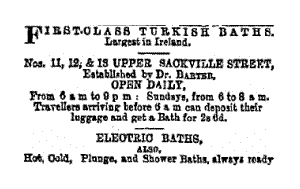2. The baths under Michael Duggan and son

Soon after Kelly was appointed, Richard Barter decided, as his father had done before him, to end direct ownership of his baths once they had become firmly established. Instead, the premises and facilities would be leased to someone else who would then run the business as an independent proprietor.
So on 6 March 1874, the baths changed hands and Michael Duggan (previously Steward of the Agricultural Club and therefore well-known to Barter) became the new proprietor, paying him £800 a year in rent.14 Initially, Duggan seems to have managed the baths and the hotel himself, but the baths were decorated and improved in 1877 and after this he appointed a Mr M H Williams as manager.15
Most of the improvements, apart from the electric bath, seem to have fallen into the category of redecoration and repair, but there were also cosmetic improvements to the outside of the building. At each side of the doorway 'a large lamp of coloured glass bearing the name of the establishment and supported by an arm clad in armour reaching out from the wall' was added. Inside, the entrance and hallway were much altered and a fountain added.15 To take account of these improvements Duggan's rent was increased to £810 a year, payable in monthly instalments.14

In August 1878, at the time of this advertisement,16 the two main competing Turkish baths in Dublin (both originally built by Dr Barter) were joined by a new competitor, the Stephen's Green Turkish Baths opened by Henry J Jury of Jury's Hotel. Although the new baths were closer to Lincoln Place than Upper Sackville Street, central Dublin was not so large that the baths were not equally competitive with each other.
At the same time, the hotel was also improved, and included in its advertisements were tasty inducements to try the restaurant, and a rather coy pretence that the two establishments were separately owned.17
Table d'Hote at Half-past Six daily, comprising Two soups, Two Fishes, Two Entrees, Joints, Vegetables, and Cheese, Three Shillings and Sixpence. N B—The Proprietor having entered into arrangement with the owner of the Turkish Baths, the charge to visitors staying at the 'Hammam' is only One Shilling for the Bath.
Further decorative improvements were carried out the following year, and much of the furniture was replaced by items which were more easily cleaned and therefore more hygienic. It may be that this is where competition from Jury's establishment led the way. The new couches were of wirework covered in easily cleaned matting. The shampooing benches were made of plain wooden planks. The floors were tiled and the washing facilities renewed.18
Michael Duggan died on 4 July 1881 and his son took over for a few months. However, the rental agreement between Barter and Michael Duggan was 'for the term of Mr Duggan's life' and, for whatever reason, his son omitted to inform Barter of his father's death. Barter was not at all pleased, and took Duggan Jnr to Court seeking to recover possession of the Hammam.
Duggan claimed that a new letting had been made to him by virtue of Barter's acceptance of the rent, paid two days after his father's death. But the jury found for Barter on the basis that when he accepted the rent he was not aware that Duggan had died.14
